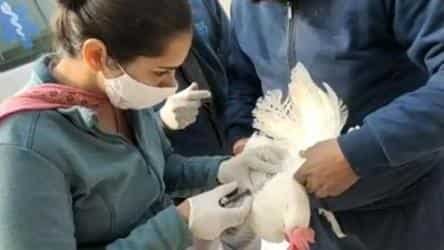Key Points:
- Zoos across the country were put on alert on Tuesday after the bird flu outbreak in the region, including Himachal Pradesh.
- The Union ministry has requested states and the UTs to take all possible measures/precautions to prevent the transmission of disease in other animals, birds and human beings.
Zoos across the country were put on alert on Tuesday after the bird flu outbreak in the region, including Himachal Pradesh.
After the highly infectious Asian avian influenza (H5N1) led to the death of more than 2,500 migratory birds in Pong Dam wetland in Himachal’s Kangra district besides 1 lakh poultry birds in Haryana’s Barwala belt in Panchkula district suspected to be due to the virus, the Union ministry of environment, forests and climate change sounded the alert among zoos with the Central Zoo Authority (CZA) rolling out an advisory on January 4, directing the authorities to remain vigilant for animals showing symptoms.
The Centre asked the zoo authorities to prepare and prevent the ingress of avian influenza in line with the national action plan on prevention, control and containment of the flu. “It is advised that all zoos remain alert and vigilant for any symptoms among captive animals and incidence, if any, in nearby areas,” said Dr Sonali Ghosh, a deputy inspector general of forests, in a letter to the member secretary of state zoo authority and officers in charge of all zoos.
The CZA has designated the Centre for Wildlife Conservation Management and Disease Surveillance as the national referral centre on wildlife healthcare and asked zoos to consult the principal scientist and in-charge, Centre for Wildlife, ICAR-Indian Veterinary Research Institute for technical advice.
In another urgent letter to the chief wildlife warden of all states and Union Territories, Rakesh Kumar Jagenia, the deputy inspector general of forests (wildlife) expressed concern over the deaths of a large number of birds, including migratory birds.
Considering this grave situation, the Union ministry has requested states and the UTs to take all possible measures/precautions to prevent the transmission of disease in other animals, birds and human beings.
Haryana’s chief conservator of forests (wildlife) ML Rajvanshi, said: “So far, we have not detected mortality among birds in Sultanpur and Bhindawas wetlands. We are on the alert.”
PREVENTION AND SAFETY
*Wear rubber gloves and protective clothing that can be disinfected or disposed of and protective eyewear or a face shield while handling animals.
*Wash hands with soap and water often and disinfect work surfaces and equipment between sites.
*Do not eat, drink, or smoke while handling animals.
*Minimise exposure to mucosal membranes by wearing protective eyewear (goggles).
*The influenza virus is sensitive to many common disinfectants such as detergents, 10% household bleach, alcohol and other commercial disinfectants. The virus is much more difficult to inactivate if it is encrusted in organic material such as faeces or soil.
*Take an influenza antiviral drug daily for the entire time you are in direct contact with infected birds or a contaminated environment.
SYMPTOMS TO LOOK OUT FOR
*Affected birds display symptoms such as tremors, diarrhoea, head tilt and paralysis.
* The disease spreads quickly causing paralysis and staggering.
*The virus is transmitted between affected poultry and recently from poultry to wild birds and vice-a-versa.
CARING FOR BIRDS
*It should be ensured that wild birds are not harmed during trapping and collection of serum samples.
*Preference should be given to the leg vein instead of the wing vein. Wing vein blood collection is reported to result in haemorrhage, affecting normal flight, making them susceptible to predators.
*Awareness should be spread that any sighting of a dead bird by volunteers, bird watchers, etc. should be reported to the nearest forest/animal husbandry office.

